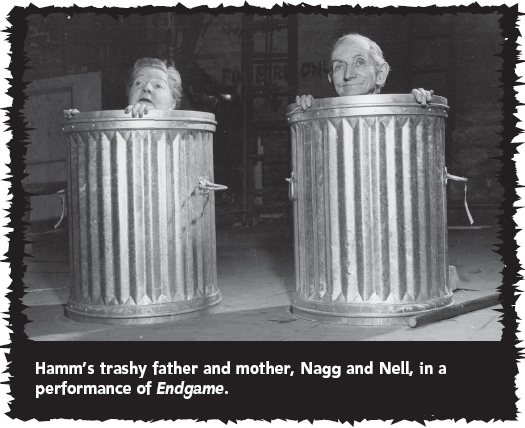 Endgame (1957)
Endgame (1957) Endgame (1957)
Endgame (1957)WRITTEN BY Samuel Beckett
COUNTRY OF ORIGIN France

This absurdist one-act play is set in a gloomy room with two windows—one called “Sea” and the other, “Earth.” Inside the room are four characters: a blind, mean-spirited man named Hamm who is confined to a chair; his servant, Clov, on whom he's utterly dependent; and Hamm's parents, Nagg and Nell, who have both lost their legs and now live in trash cans. The play starts with Clov saying, “Finished, it's finished, nearly finished, it must be nearly finished,” an expression that gets repeated a few times throughout, in different ways. Though the dialog of the play is abstract, we get the sense that these miserable four are the last humans on earth—and that now their time on the planet is coming to a close.
Throughout the play, Hamm barks orders at Clov and requests his painkillers. Clov repeatedly threatens to leave even though he admits that there is nowhere else to go. Meanwhile, Hamm's elderly parents reminisce about the good old days before they were stuck in dustbins filled with sand and had to live under their awful son's watch. Clov tries to maintain a sense of normalcy by opening the windows in the morning, planting seeds, and creating a toy dog. But the windows gaze out on an unchanging grey sky, his seeds do not sprout, and the toy dog is a poor excuse for a pet. As all of this is happening, there is a loud clock ticking, and, finally, at the end, Hamm gives a long speech, preparing to die.
More Plays Directed by Samuel Beckett
Malone Dies
(first published in French, 1951)
Waiting for Godot
(first published in French, 1952)
Krapp's Last Tape (1958)
Happy Days (1961)
 UNFORGETTABLE MOMENT
UNFORGETTABLE MOMENT
In the middle of the play, Hamm asks Clov to look out the window with his telescope and tell him what the world looks like. Clov's one-word reply is “corpsed”—which pretty much says it all.
 The Inspiration
The InspirationMany believe that Beckett's play was inspired by the fear of nuclear war that existed during the Cold War. The Cold War was basically a standoff between the Communist Soviet Union and the Democratic United States and its allies. It was termed the Cold War because there were no actual attacks on anyone, just a feeling of hostility between the countries based on their political differences. That said, both the Soviet Union and the United States had nuclear weapons in their possession, and people often feared that one or both of the superpowers might use the weapons to cause mass destruction. The Cold War lasted from the end of World War II (mid-1940s) until the end of 1991, when the Soviet Union was dissolved and became the more democratic Russia.
 EALITY FACTOR
EALITY FACTOR
Since the cause of the apocalypse in Endgame is never truly divulged, it's hard to offer a reality factor. On a more literal level, however, there are probably lots of people who feel like they are trapped in miserable circumstances that they can't escape.
Another more obvious inspiration for the play was the game of chess: The word “endgame” is used in chess to designate the last, very predictable, stage of a game.
 The Impact
The Impact QUOTABLES
QUOTABLES 
Hamm: Nature has forgotten us.
Clov: There's no more nature.
Hamm and Clov reflecting on the utter lack of anything natural in their lives

Hamm: I was never there.
Clov: Lucky for you.
Hamm: Absent always. It all happened without me. I don't know what's happened.
Hamm says this toward the end of the play, musing about how quickly time (and life) passes by